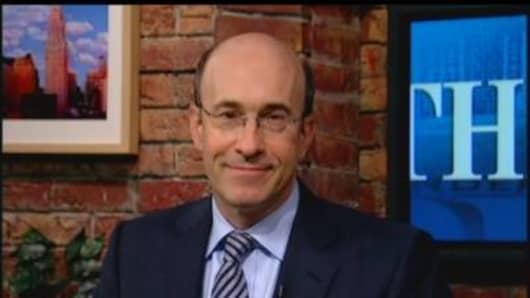Adding fuel to to an already contentious debate over whether tough austerity measures are helpful or harmful to an economy, is a new revelation that there was a mathematical error in an influential economic research study, often cited as having paved the way for fiscal policies pursued by the U.S. and Europe.
The charge was raised in a paper, released Tuesday, by an economics doctoral student and two professors at the University of Massachusetts that called into question the findings of Harvard economists Carmen Reinhart and Kenneth Rogoff's 2010 paper "Growth in a Time of Debt," which concluded debt over a certain level was dangerous for countries.
Reinhart and Rogoff said they made a bad calculation within an influential economic research paper in 2010, but rebut claims that the errors were made intentionally. They also stand behind the central theme of the paper that too much public debt will slow economic growth.
(Read More: IMF Deals Blow to UK's Growth Optimism)
According to the original report by Reinhart and Rogoff, high levels of debt-to-GDP lead to long periods of slow growth. Specifically, they said, median growth rates for countries with public debt over 90 percent of GDP are roughly one percent lower than they would be otherwise. They also said countries with debt above this threshold would contract roughly 0.1 percent annually.
But now those figures are being questioned.
"We replicate Reinhart and Rogoff and find that coding errors, selective exclusion of available data, and unconventional weighting of summary statistics lead to serious errors that inaccurately represent the relationship between public debt and GDP (gross domestic product) growth among 20 advanced economies in the post-war period," economists Thomas Herndon, Michael Ash, and Robert Pollin of the University of Massachusetts said in the new report on Tuesday.
(Read More: IMF: There Is No Silver Bullet for Debt Concerns)
"The average real GDP growth rate for countries carrying a public-debt-to-GDP ratio of over 90 percent is actually 2.2 percent, not -0.1 percent," they said.
The new document refutes the relationship between public debt and GDP growth when it reaches above the 90 percent level and adds that there is a "major non-linearity in the relationship" between these two factors.
Reinhart and Rogoff said Wednesday Herndon, Ash, and Pollin are correct in spotting the error, adding that they made a "regrettable slip" with a calculation in one of the report's data tables but believe that it doesn't change the central message of the paper.
"The authors show our accidental omission has a fairly marginal effect on the 0-to-90-per-cent buckets in figure 2....However, it leads to a notable change in the average growth rate for the over-90-per-cent debt group. The median growth rate we report is the right order of magnitude," they said in their second response on Wednesday.
The Harvard economists have also hit back at claims that they made selective omissions in their original piece of work.
"This charge, which permeates through their paper, is one we object to in the strongest terms," they said. "The 'gaps' are explained by the fact there were still gaps in our public data debt set at the time of this paper, a data set no one else had ever been able to construct before and which we now have filled in much more completely."
Reinhart and Rogoff's work is often cited as having a major influence in recent years on public policy and the management of government debt. Their research had several high-profile advocates including the European Commissioner for Economic and Monetary Affairs Olli Rehn who has cited the 90-percent threshold during key debates about euro zone budgetary tightening.
In their defense, Reinhart and Rogoff initially released a statement on Tuesday saying, Herndon, Ash and Pollin's research is "in fact, of a similar order of magnitude to the detailed country-by-country results we present in table 1 of the AER paper."
They added that the Bank of International Settlements (BIS), the International Monetary Fund (IMF) and the Organization for Economic Cooperation and Development (OECD) had also published research "which virtually all find very similar conclusions to [our] original findings, albeit with slight differences in threshold, and many nuances of alternative interpretation."
(Read More: Krugman Takes on Thatcher's Legacy as Debate Rages)
Nobel prize-winning economist Paul Krugman, a critic of Reinhart and Rogoff's research, also jumped into the debate late on Tuesday.
"The fact is that when you compare the results head to head, (Reinhart and Rogoff) looks very off," Krugman said on his New York Times blog of the new research published by the University of Massachusetts. "Something went very wrong, and pointing to your other results isn't a good defense."
—By CNBC.com's Matt Clinch; Follow him on Twitter @ mattclinch81



